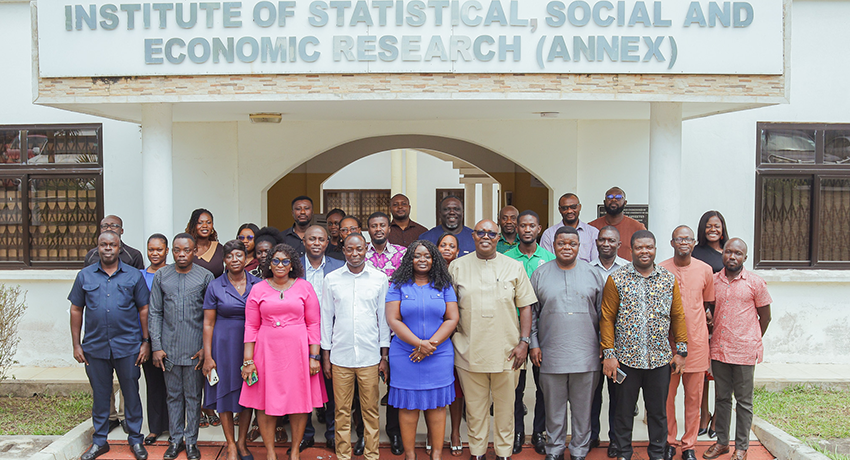The Institute of Statistical, Social and Economic Research (ISSER) hosted a stakeholder workshop to present findings from a study examining the effects of start-up skill training and business support on self-employment and entrepreneurship among young people engaged in National Service.
Themed “Start-Up Skills Training for the Youth: Evidence from an Experiment in Ghana”, the event brought together representatives from the National Service Authority, the Ministry of Youth Development and Empowerment, the National Youth Authority, and other agencies focused on youth and employment. Discussions centered on the outcomes and policy implications of the study, which began in 2022, providing a foundation for shaping programmes that can enhance youth employment and entrepreneurship in Ghana.
Evidence for effective policy

Delivering remarks at the event, ISSER Director Prof. Robert Darko Osei, underscored the value of evidence-based policymaking.
“One of the surest ways of being effective is using evidence to inform decisions. We at ISSER are excited about this research,” he stated adding that the workshop offered an important opportunity for stakeholders to engage with the findings and ask critical questions.

Principal Investigator (PI) Prof. Peter Quartey gave the welcome remarks, urging open and candid conversations, while Co-PI Prof. Agyapomaah Gyeke-Dako and project team member Dr. Emmanuel Abbey presented an overview of the findings. Their presentations set the stage for lively discussions on the outcomes and their policy implications.

ISSER commended for timely and relevant research

Dr. Elizabeth Zotorvie, Director of Policy Planning, Research, Monitoring and Evaluation at the National Service Authority (NSA), lauded ISSER for undertaking what she described as “timely and relevant” research.
She highlighted the growing complexity of youth unemployment in Ghana, where many graduates leave tertiary education with high expectations but encounter limited opportunities, structural barriers, and a mismatch between academic training and labour market demands. She noted that the study’s findings resonate strongly with these realities and would be valuable in shaping ongoing reforms within the national service scheme.
“The findings of ISSER will enrich our understanding of the barriers graduates face and guide us in shaping better policies and practical interventions,” Dr. Zotorvie said.
Beneficiaries share experiences

Beneficiaries of the training also shared how the programme had influenced their entrepreneurial journeys. Prince Nyator, a graphic designer, said:
"Like many entrepreneurs, I faced challenges in setting up my graphic design business. “This programme taught me to take calculated risks and make efficient use of limited resources. It has been an invaluable boost for my business journey.”
Stakeholders enrich the discussions

Project team members Profs. Ebo Turkson and Edward Asiedu guided the discussions, drawing contributions that will help strengthen the study’s outputs and recommendations.
The workshop brought together representatives from the Ministry of Youth Development and Empowerment, the National Service Secretariat, the Ghana Enterprises Agency, the National Youth Authority, the National Entrepreneurship and Innovation Programme, and the Youth Employment Agency, as well as project beneficiaries and innovators.
In his closing remarks, Prof. Quartey thanked participants and observed that:
“The insights gained from the discussions will serve as a critical foundation for shaping relevant policies and programmes that enhance youth employment and entrepreneurship in Ghana.”
“The insights gained from the discussions will serve as a critical foundation for shaping relevant policies and programmes that enhance youth employment and entrepreneurship in Ghana.”

The event was held on 30 September 2025 at ISSER.
- Log in to post comments

